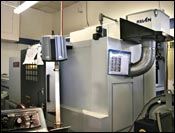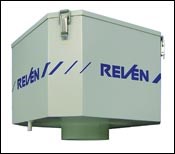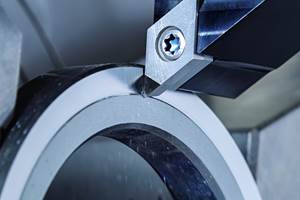Managers Make Clean Air Top Priority
These shops have made maintaining a clean shopfloor environment a top priority. With Reven Recojet-1 mist separators from Tecnara Tooling Systems, they have been able to do just that with virtually no investment in floor space or time-consuming maintenance.
Share




Bodo Meschkat and Brian O’Rell, each a manager of a busy, high-end California shop, often find themselves battling the clock to meet urgent customer demands for medical and aerospace parts. “I never seem to have a spare minute,” Mr. Meschkat says. However, despite intense production pressures, both find the time to maintain a clean shop environment. According to Mr. O’Rell, that’s because nothing is more important than employee health. Air pollutants commonly found in shop environments, such as oil mist, can cause cancer and other serious conditions.
Mr. Meschkat feels the same way. He owns Meschkat Precision Machining, a Santa Clarita-based company specializing in high-precision parts for the medical industry. Until recently, the shop had a serious problem caused by emissions from the dielectric hydrocarbon fluids used by its wire and die-sinking EDMs. The EDM filtration system adequately cleaned the coolant water, but shop air was still a problem.
“It smelled awful,” says machinist Kevin Stoll. “You tried to avoid the EDM room. Now, the stink and smoke have disappeared.” The solution to the problem can be found mounted atop the shop’s EDMs—two blue and white Reven Recojet-1 mist separators from Tecnara Tooling Systems. The devices use the company’s custom X-Zyklon separation system, which mechanically removes air pollution and toxic substances at the source, in this case, the EDMs.
The X-Zyklon system consists of a series of aluminum extrusions that are arranged to form a network of curving channels. A motor in the unit pulls shop air into these channels, which are about 5 mm wide. The sides of the extrusions are dimpled like a golf ball to reduce drag forces and quickly accelerate the air flow. Because of their density, particles in the air can’t accelerate fast enough to move around the curves. These particles hit the walls of the aluminum extrusions and fall harmlessly out of a hole in the bottom of the unit, while the newly cleaned air is released into the shop.
Mr. Meschkat has since ordered several more Reven units for the shop’s other machines. The shop has experienced rapid growth during the past few years, so Mr. Meschkat says he is especially pleased with the portability of the units. The compact, lightweight devices can be carried by one person, and they don’t require venting or filter replacement. “That makes a huge difference when we start moving things around—which lately has been pretty often,” Mr. Meschkat says.
Mr. O’Rell, manager of Vanderhorst Brothers in Simi Valley, has applied the same solution to the oil-mist contamination problem caused by his conventional machining centers. The shop has a diversified customer base, including independent inventors in Southern California, defense companies in New York City and optical companies in Canada. Like Mr. Meschkat’s shop, Vanderhorst has recently experienced significant growth, leading to the purchase of new machines and overcrowding on the shop floor. The Reven units can be mounted directly atop machines because they cause virtually no extra vibration. With elbow room at a premium, Mr. O’Rell says he likes the fact that the mist separators have virtually no footprint.
“We couldn’t have functioned with floor-standing units,” he says. “We’re keeping ahead of the game by installing more units, and they won’t take up a single square foot of the floor.”
Before purchasing the Recojets, the shop used older, vented oil-mist separators that required the installation of large, rigid ducts on the exterior of the building. “We thought we’d need to install a fan system for the new machines,” Mr. O’Rell says. “Now, we simply mount the Recojets on the machining centers, and they go where the machines go. That’s given us a huge jump in flexibility. Most important, they do the job with no filter replacement and virtually no maintenance.”
Related Content
Vollmer Ultrasonic Cleaning, Deburring System Provides Process Reliability
IMTS 2024: The UltraTec Ultrasonic A25 cleans and deburrs small and delicate components, making it well suited for applications in heavily regulated sectors with challenging demands.
Read MoreTungaloy-NTK PCD Grade Optimizes Dimensional Accuracy
The DX200 is an effective tool for machining application-specific components that demand high levels of material purity, such as metal medical implants and sputtering targets for semiconductor applications.
Read MoreSupercritical Success for Medical Machining
High-pressure carbon dioxide coolant can dramatically improve the production rate of titanium parts while leaving no residue — an excellent fit for medical machining.
Read MoreMikron Milling Tool Suppresses Machining Chatter
IMTS 2024: The CrazyMill Cool CF milling tool features chatter suppression during machining, especially on thin-walled parts, which enables smoother cutting.
Read MoreRead Next
Registration Now Open for the Precision Machining Technology Show (PMTS) 2025
The precision machining industry’s premier event returns to Cleveland, OH, April 1-3.
Read More5 Rules of Thumb for Buying CNC Machine Tools
Use these tips to carefully plan your machine tool purchases and to avoid regretting your decision later.
Read MoreSetting Up the Building Blocks for a Digital Factory
Woodward Inc. spent over a year developing an API to connect machines to its digital factory. Caron Engineering’s MiConnect has cut most of this process while also granting the shop greater access to machine information.
Read More

























.jpg;maxWidth=300;quality=90)










.jpg;maxWidth=970;quality=90)